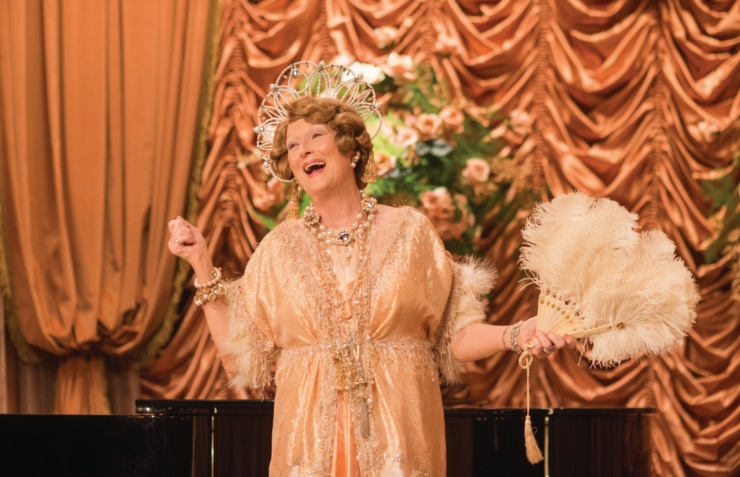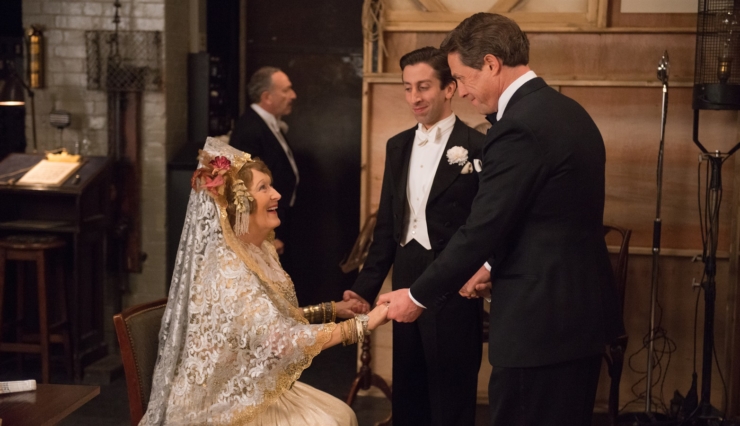Opera is known for producing some of the most beautiful sounds in music, Florence Foster Jenkins successfully takes music in a…different direction.
Directed by Stephen Frears, Florence Foster Jenkins retells the amusing true story of a New York socialite and heiress who went on to become an Opera Singer in 1944 despite having virtually no singing ability. It stars Meryl Streep in the titular role, as Florence Foster Jenkins. Hugh Grant plays her husband, St. Clair Bayfield while Simon Helberg portrays Cosmé McMoon, Jenkin’s pianist and accompanist. This unlikely trio complement each other superbly due to the gentle development of their relationships and ample opportunities for smartly executed humour.

The comedy of the film is by far the film’s strongest asset but Florence Foster Jenkins has a lot more going for it than most comedy fare in Hollywood today. The humour of the film is smart and witty and comes in many forms, whether its Bayfield’s charming Englishness, Jenkins’s many eccentricities or McMoon’s fears for his reputation. Still it is Jenkins’s singing which brings the laughs to a crescendo. Jenkin’s voice is so terrible it’s hilarious and though it’s utilized so frequently throughout it never feels overused, and the humor that results never becomes stale. Indeed Jenkin’s singing is just so bad it becomes good and we the audience are as enthralled as much as the real life audience at Carnegie Hall in 1944.

What makes Jenkins such an enthralling character is her eccentricity. There is simply nothing boring about her and her strange whims successfully keep the audience engaged, whether by her obsession with potato salad or the mysterious brown bag she carries on her person at all times. Streep gives an amazing performance and successfully manages to maintain her status as one of Hollywood’s greatest actresses.
Of course, the entire cast was very strong and Hugh Grant cannot be ignored. This is not a role unlike any we have seen him play before so he comes into his element here as the charming St. Clair. Yet not everything about Bayfield is pristine, the love he has for his wife and that for his mistress (played by Rebecca Ferguson) is a constant source of conflict which serves to add a darker dimension to his character which adds an all new layer to the story. Finally Helberg’s Cosmé McMoon represents stability among all the chaos. As a newcomer to Jenkin’s world he sees her vocal prowess for what it really is but like everyone else is unable to break the illusion for his patron, which is of course a source of constant irritation for him. Helberg’s provides an exception performance as the balance to all the mayhem.

Frears is to be commended for his attention to detail in providing an in-depth and colourful view of New York high society in the 1940s. Through his camera lens we are given a glimpse into a world entirely different from our own and this is further complimented by the strong performances of all the actors.
This film can be referred to as a ‘comedy for adults’. That is not to say younger audiences would not derive enjoyment from the content but the sharp witty use of comedy are unlikely to resonate as effectively for fledgling viewers. Nevertheless I believe this film has something for everyone. Throughout the story, Jenkins frequently refers to the importance of music, it is not until the films end that we realise it is not the sound that strikes our ears that matters but how it moves our hearts.







